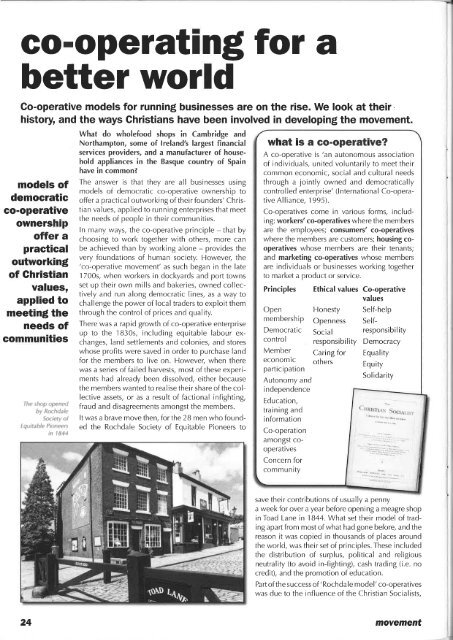Movement 124
You also want an ePaper? Increase the reach of your titles
YUMPU automatically turns print PDFs into web optimized ePapers that Google loves.
co-operatin$ for a<br />
better world<br />
Co-operative models for running businesses are on the rise. We look at their.<br />
history and the ways Ghristians have been involved in developing the movement.<br />
models of<br />
democratic<br />
co-operative<br />
ownership<br />
offer a<br />
practical<br />
outworking<br />
of Ghristian<br />
valuesn<br />
applied to<br />
meeting the<br />
needs of<br />
communities<br />
The shop opened<br />
by Rochdale<br />
Society of<br />
Equitable Pioneers<br />
in 1844<br />
What do wholefood shops in Cambridge and<br />
Northampton, some of lreland's largest financial<br />
services providers, and a manufacturer of household<br />
appliances in the Basque country of Spain<br />
have in common?<br />
The answer is that they are all businesses using<br />
models of democratic co-operative ownership to<br />
offer a practical outworking of their founders' Christian<br />
values, applied to running enterprises that meet<br />
the needs of people in their communities.<br />
ln many ways, the co-operative principle - that by<br />
choosing to work together with others, more can<br />
be achieved than by working alone - provides the<br />
very foundations of human society. However, the<br />
'co-operative movement' as such began in the late<br />
1700s, when workers in dockyards and port towns<br />
set up their own mills and bakeries, owned collectively<br />
and run along democratic lines, as a way to<br />
challenge the power of local traders to exploit them<br />
through the control of prices and quality.<br />
There was a rapid growth of co-operative enterprise<br />
up to the 1830s, including equitable labour exchanges,<br />
land settlements and colonies, and stores<br />
whose profits were saved in order to purchase land<br />
for the members to live on. However, when there<br />
was a series of failed harvests, most of these experiments<br />
had already been dissolved, either because<br />
the members wanted to realise their share of the collective<br />
assets, or as a result of factional infighting,<br />
fraud and disagreements amongst the members.<br />
It was a brave move then, for the 2B men who founded<br />
the Rochdale Society of Equitable Pioneers to<br />
what is a co-operative?<br />
A co-operative is 'an autonomous association<br />
of individuals, united voluntarily to meet their<br />
common economic, social and cultural needs<br />
through a jointly owned and democratically<br />
controlled enterprise' (lnternational Co-operative<br />
Alliance, 1995).<br />
Co-operatives come in various forms, including:<br />
workers'co-operatives where the members<br />
are the employees; consumers' co-operatives<br />
where the members are customers; housing cooperatives<br />
whose members are their tenants;<br />
and marketing co-operatives whose members<br />
are individuals or businesses working together<br />
to market a product or service.<br />
Principles<br />
Open<br />
membership<br />
Democratic<br />
control<br />
Member<br />
economic<br />
participation<br />
Autonomy and<br />
independence<br />
Education,<br />
training and<br />
information<br />
Co-operation<br />
amongst cooperatives<br />
Concern for<br />
community<br />
Ethical values Co-operative<br />
values<br />
Honesty Self-help<br />
Openness Self-<br />
Social<br />
responsibility<br />
responsibility Democracy<br />
Caring for Equality<br />
others<br />
Equity<br />
Solidarity<br />
Crtntsrraiv .Socl,tr-tsr<br />
r rFrrn4n,.!*r!r.rxr<br />
.; .-,,:-.'--*<br />
^: i_:. :.-.:; j-:_: i. :_--:.: -.<br />
save their contributions of usually a penny<br />
a week for over a year before opening a meagre shop<br />
in Toad Lane in 1844. What set their model of trading<br />
apart from most of what had gone before, and the<br />
reason it was copied in thousands of places around<br />
the world, was their set of principles. These included<br />
the distribution of surplus, political and religious<br />
neutrality (to avoid in-fighting), cash trading (i.e. no<br />
credit), and the promotion of education.<br />
Partof the success of 'Rochdale model'co-operatives<br />
was due to the influence of the Christian Socialists,<br />
24 movement

















